
Beijing



Friday 11 August - Sunday 13 August: Beijing
We arrived in Beijing on August 1. The sky resembled the dome in ‘Truman Show’ when someone forgets to switch on the clouds – a white dome sealing off hot, moist air. Pittsburgh * 10, we were covered in sweat within minutes. The drive to the hotel took one hour, past rotting communist “Plattenbau” high rises and shining new ones – for the Olympics. Beijing 2008 in general is a big deal: The entire city is a construction site (our guide, Dorien, tells us), lots of renovation going on, too – a city sprucing up. 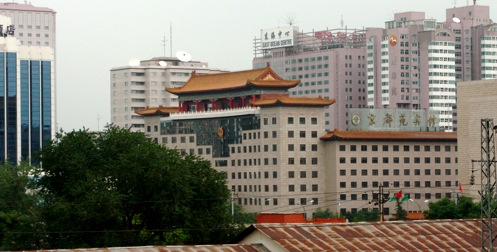

The first day in Beijing: Argh. We’d shared the plane with some Italian sports team, adolescents in blue “Italia” lounge suits, and spent the first dazed, confused, and jetlagged day exploring the vicinity of the hotel, trying to find the “Temple of Heaven,” which was supposed to be in a park, but all we found was a an endless wall, and when we finally found an entry, ca. 12-year-old guards shouted at us and made us go away.
Summary: The first day sucked. I hated Beijing, every bone ached – four more weeks of this? Yikes.
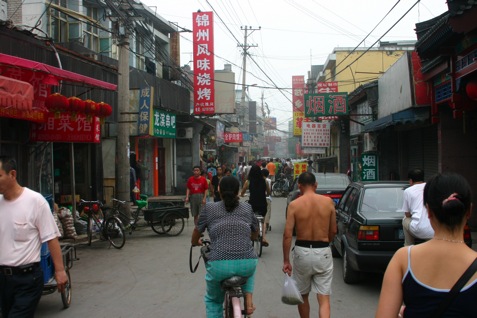 Dinner the first evening: a first inkling of the possibility that Beijing and China might be wonderful – and that the problem might be the Jetlag…our group had dinner at the ‘Purple Vine’ teahouse, where they also sold antiques. Lots of dark wood, steaming fountains and bowls, and the food. The food. The food. Let’s start with dessert: Deep fried banana chunks caramelized by ourselves by dunking them in sugar water (chopstick clumsiness galore). Then: beans in a kind of tapenade made of garlic and ground lamb meat. Mini slices of spicy chicken and vegetables wrapped in dough. Buttered crispy corn. Slices of <unknown vegetable> in fine vinegar and oil. And more.
Dinner the first evening: a first inkling of the possibility that Beijing and China might be wonderful – and that the problem might be the Jetlag…our group had dinner at the ‘Purple Vine’ teahouse, where they also sold antiques. Lots of dark wood, steaming fountains and bowls, and the food. The food. The food. Let’s start with dessert: Deep fried banana chunks caramelized by ourselves by dunking them in sugar water (chopstick clumsiness galore). Then: beans in a kind of tapenade made of garlic and ground lamb meat. Mini slices of spicy chicken and vegetables wrapped in dough. Buttered crispy corn. Slices of <unknown vegetable> in fine vinegar and oil. And more. 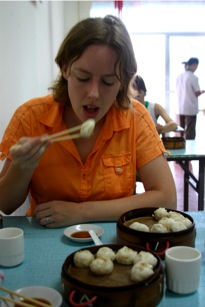 Oh, the food so far. The food!
Oh, the food so far. The food!Our group, the world travelers. Some are old, some are young, and almost everyone (but me) has a story about an exotic country they visited, or more. A quiet, open, non-obnoxious group (in so far as groups can be non-obnoxious). We joke about going on a chopstick diet – eating only as much as our suboptimal chopstick skills allow.
When I walk through Beijing, I constantly have to remind myself that China is still a communist country. The occasional remnant of the old ways seems like the old buildings in the former DDR, like the great hall of the people on Tianamen square. 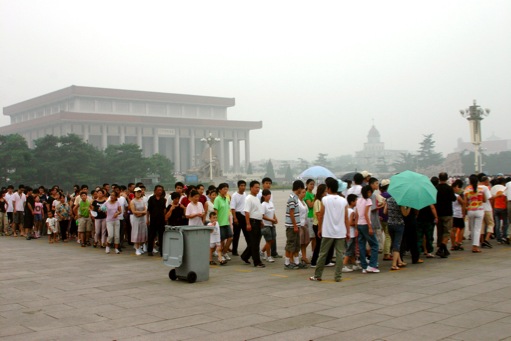 Only long lines of people waiting to see Mao’s Mausoleum with guards making sure everyone stays exactly within the lines remind you of the split reality that is Beijing. On the one hand there is emerging capitalism, with high skyscrapers , mobile phones, modern cars, fancy clothing, and on the other hand there are the old ways: people doing gymnastics in designated places in the city, areas that look like playgrounds but that are really public fitness centers.
Only long lines of people waiting to see Mao’s Mausoleum with guards making sure everyone stays exactly within the lines remind you of the split reality that is Beijing. On the one hand there is emerging capitalism, with high skyscrapers , mobile phones, modern cars, fancy clothing, and on the other hand there are the old ways: people doing gymnastics in designated places in the city, areas that look like playgrounds but that are really public fitness centers.
 Only long lines of people waiting to see Mao’s Mausoleum with guards making sure everyone stays exactly within the lines remind you of the split reality that is Beijing. On the one hand there is emerging capitalism, with high skyscrapers , mobile phones, modern cars, fancy clothing, and on the other hand there are the old ways: people doing gymnastics in designated places in the city, areas that look like playgrounds but that are really public fitness centers.
Only long lines of people waiting to see Mao’s Mausoleum with guards making sure everyone stays exactly within the lines remind you of the split reality that is Beijing. On the one hand there is emerging capitalism, with high skyscrapers , mobile phones, modern cars, fancy clothing, and on the other hand there are the old ways: people doing gymnastics in designated places in the city, areas that look like playgrounds but that are really public fitness centers.Tianamen Square: What an architectural atrocity. Another example of communist inability to do nice buildings and convincing monuments. (Niels mentioned the fatal effect of dishonest intentions and the lack of a true creative impulse.) An endless sprawling concrete plain. On the ground we spot a narrow, painted pathway, on which people shuffle patiently forward to see Mao’s mausoleum and his taxidermed corpse. A queue of people perhaps three persons wide meandering across the vast plaza while a gentle female voice chats to them from a row of radio speakers. 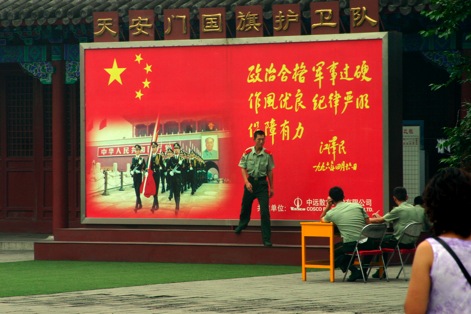 And the guards! Guards make sure no-one steps out of the narrow “pathway.” Guards guard the flag, Guards stand around and in front of the Forbidden City. All of them look incredibly young (in their late teens). They must be dying in this heat. It’s bizarrely hot and humid, and they wear thick green uniforms. Next to each guard stands an umbrella, a parasol looking freshly imported from Mallorca or some ice café in an Italian tourist hotspot. Considering that, the guards look surprisingly dignified.
And the guards! Guards make sure no-one steps out of the narrow “pathway.” Guards guard the flag, Guards stand around and in front of the Forbidden City. All of them look incredibly young (in their late teens). They must be dying in this heat. It’s bizarrely hot and humid, and they wear thick green uniforms. Next to each guard stands an umbrella, a parasol looking freshly imported from Mallorca or some ice café in an Italian tourist hotspot. Considering that, the guards look surprisingly dignified.
 And the guards! Guards make sure no-one steps out of the narrow “pathway.” Guards guard the flag, Guards stand around and in front of the Forbidden City. All of them look incredibly young (in their late teens). They must be dying in this heat. It’s bizarrely hot and humid, and they wear thick green uniforms. Next to each guard stands an umbrella, a parasol looking freshly imported from Mallorca or some ice café in an Italian tourist hotspot. Considering that, the guards look surprisingly dignified.
And the guards! Guards make sure no-one steps out of the narrow “pathway.” Guards guard the flag, Guards stand around and in front of the Forbidden City. All of them look incredibly young (in their late teens). They must be dying in this heat. It’s bizarrely hot and humid, and they wear thick green uniforms. Next to each guard stands an umbrella, a parasol looking freshly imported from Mallorca or some ice café in an Italian tourist hotspot. Considering that, the guards look surprisingly dignified.Day 2 – Instead of feeding on the breakfast buffet in the lobby, we accompany Dorien to a breakfast in the neighborhood around our hotel, the so-called “hutongs.” For the first time, we have the feeling: This is really China – a different culture. We’re actually here instead of inside a tourist bubble.
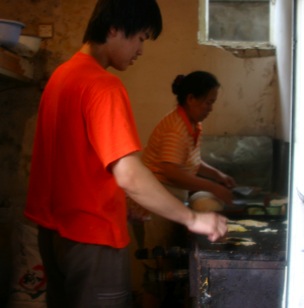
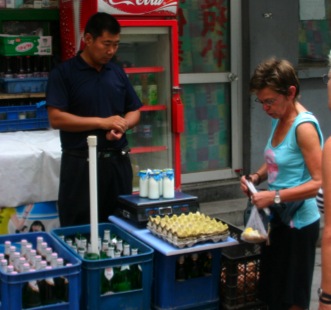 We buy bread in a small kitchen in a crack in the wall, staffed by a young boy – freshly baked bread with egg. We walk on through the narrow streets, past small houses, laundry lines, people sitting on stools, chatting, fanning themselves. Occasionally, we spot big, red lanterns. Some shop owners wash the street in front of their shops. Most sell bottles water, Sodas (Chinese characters on coke cans, etc.), ice cream, snacks, and fresh fruit. A man comes out of his house carrying a covered vase – vase is printed with mountainous landscape – and empties it into a sewer. Urine. It’s already hot in the early morning, and extremely humid. In some places, the smell is oppressive. Trash on the streets. Yet on the whole the impression is one of liveliness, control and…dignity? It keeps the hutongs from resembling an impoverished ghetto. Neither hostility nor curiosity greets us, there’s no begging.
We buy bread in a small kitchen in a crack in the wall, staffed by a young boy – freshly baked bread with egg. We walk on through the narrow streets, past small houses, laundry lines, people sitting on stools, chatting, fanning themselves. Occasionally, we spot big, red lanterns. Some shop owners wash the street in front of their shops. Most sell bottles water, Sodas (Chinese characters on coke cans, etc.), ice cream, snacks, and fresh fruit. A man comes out of his house carrying a covered vase – vase is printed with mountainous landscape – and empties it into a sewer. Urine. It’s already hot in the early morning, and extremely humid. In some places, the smell is oppressive. Trash on the streets. Yet on the whole the impression is one of liveliness, control and…dignity? It keeps the hutongs from resembling an impoverished ghetto. Neither hostility nor curiosity greets us, there’s no begging. We buy cold yoghurt at one of the shops. The vendor gives us straws with the glasses and we suckle the yoghurt at his shop – the best yoghurt in the world, just slightly sweet. We give him the empty glasses, which he collects for recycling. He keeps a turtle in an open plastic box, a strange kind with red stripes around the eyes. It’s displayed as part of the food items, and Dorien says it’s not impossible that it will be eaten, but the next morning it’s still there. When it almost escapes its mini-bath, a girl (the vendor’s daughter?) snatches it and places it on a pile of cloth, where it crawls around freely.
We have eat our bread with egg at a “playground” – which isn’t a playground at all, but a public fitness studio! The usual workout-machines are available for public use, built of steel, drilled into the ground. People do use them. Close to our bench, a middle aged woman and an do Tai Chi – but we might have scared them away, they appear embarrassed and soon stop.
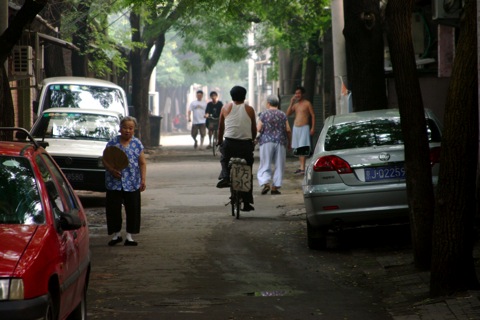 Also there are areas predating communism, the so-called Hutongs, narrow alleys in which old men play Mah-Jongg and cards, where women do their laundry and fan their faces to ward of the heat. And there are the reminders of the old empire, the gigantic Forbidden City, empty except for the thousands who want to visit it. A city within a city it is called, and not without reason: a thick and high wall separates it from the rest of the city. Chinese have something with walls: they are everywhere, sometimes (or often, if you are a stranger!) blocking the pedestrians way. On the first day we tried and failed to find the entrance to the park around the Temple of Heaven, only to find walls in our way. On day 2 we tried again, this time having properly studied the map, and now we were successful. Fortunately it was worth it: this other famous Imperial remnant is a series of palaces and temples that the emperor only visited once a year, but with great pomp and circumstance.
Also there are areas predating communism, the so-called Hutongs, narrow alleys in which old men play Mah-Jongg and cards, where women do their laundry and fan their faces to ward of the heat. And there are the reminders of the old empire, the gigantic Forbidden City, empty except for the thousands who want to visit it. A city within a city it is called, and not without reason: a thick and high wall separates it from the rest of the city. Chinese have something with walls: they are everywhere, sometimes (or often, if you are a stranger!) blocking the pedestrians way. On the first day we tried and failed to find the entrance to the park around the Temple of Heaven, only to find walls in our way. On day 2 we tried again, this time having properly studied the map, and now we were successful. Fortunately it was worth it: this other famous Imperial remnant is a series of palaces and temples that the emperor only visited once a year, but with great pomp and circumstance. 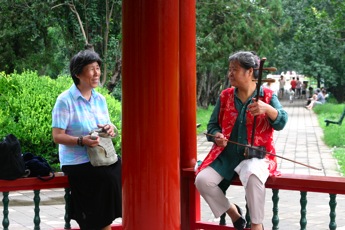
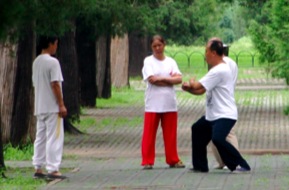
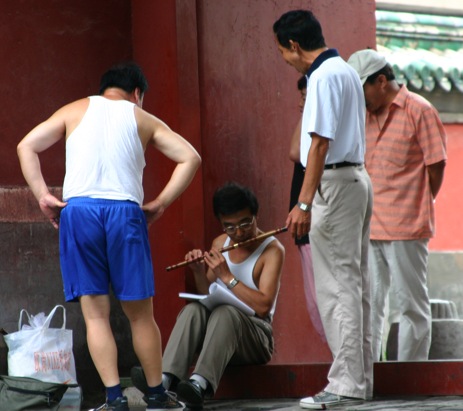 Now normal mortals can visit it, and on Sunday morning people dance, make music, do Tai-Chi, play games or just walk around. (That was on day 3, we really liked that park once we discovered the entrance, like Central Park an oasis in the business and filth of the city).
Now normal mortals can visit it, and on Sunday morning people dance, make music, do Tai-Chi, play games or just walk around. (That was on day 3, we really liked that park once we discovered the entrance, like Central Park an oasis in the business and filth of the city).Whatever the mixture of cultures is, capitalism seems to be winning. Skyscrapers are rising, stores are renewed. Part of the population rushes along in fancy (Western) clothing perusing their mobile phones while the others play Mah-Jongg in the Hutongs. We can of course be sentimental about the loss of the old ways, but people also seem to be thrilled by the new. For us visitors it would be a pity if Beijing became just like any Western city.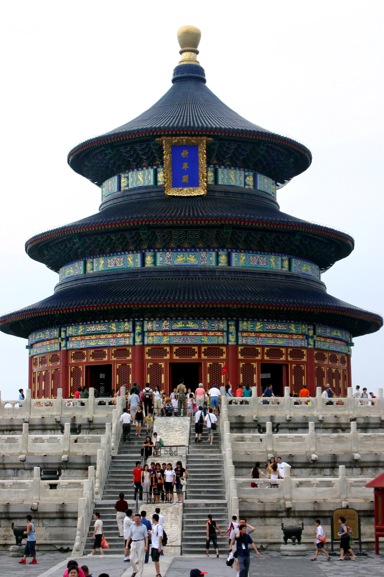

Beijing, a hybrid city. East and West. Fake Levi’s jeans, “Abercrobie & Titch” t-shirts, etc. McDonalds, Starbucks, KFC – all here. Chinese women are in general very chic, especially the obviously rich ones. Almost all wear dresses or skirts and strappy high heels, even in this heat. I feel like a fat, underdressed cow in my travel gear.
The biggest advertisement in Beijing (after the Olympics): Yoghurt. At first, Niels and I thought that advertisement we encountered again and again was for cosmetics, because the model was very beautiful and fresh faced, but smiling in front of a blue background, with a thick droplet of white liquid smashing into a creamy pool of the same…Dove? Nivea? No. Yoghurt.
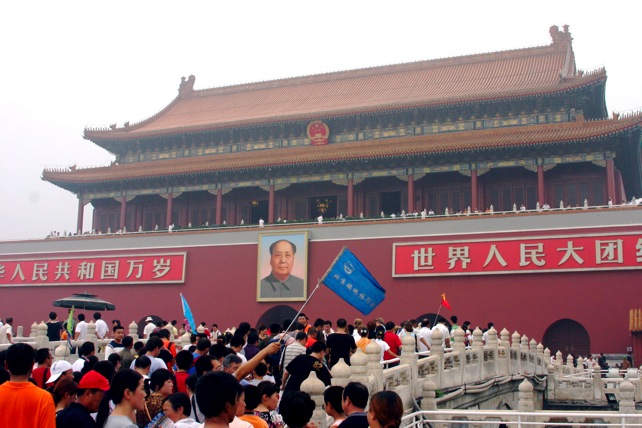
Entrance to the Forbidden City and Mao’s pimple.
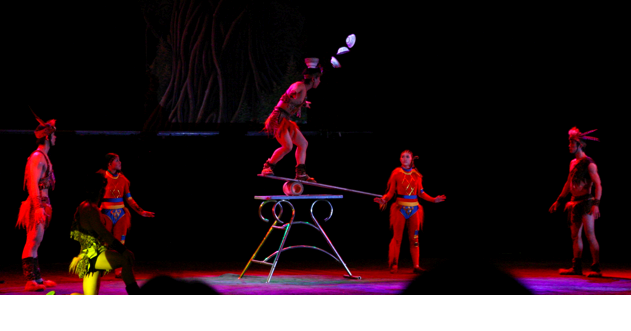
The Acrobatic Macrocosmos
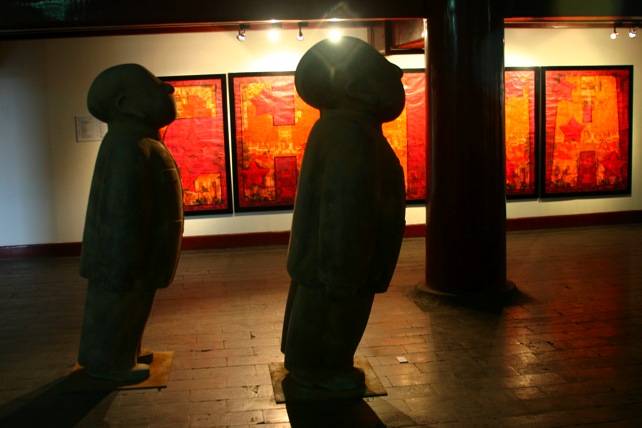
Modern Art in China: Are we mocking some people?
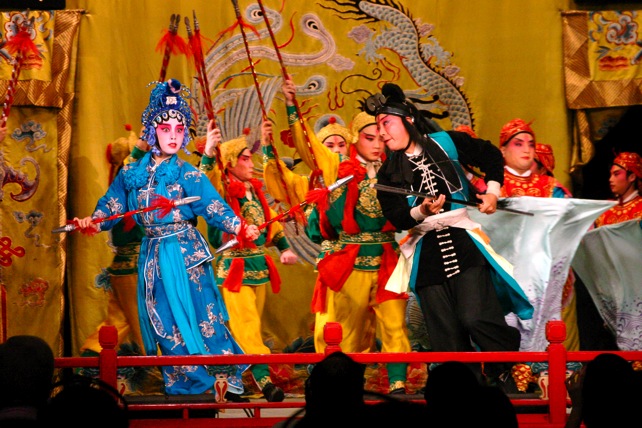
Beijing Opera


